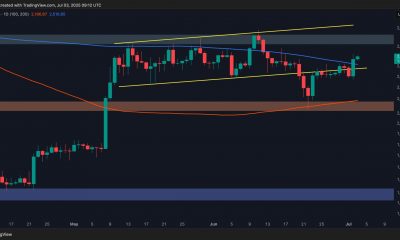Stock Markets
Craig Coleman buys $200k of Universal Biosensors stock

In a recent move that has caught the attention of the market, Craig Coleman, a director and significant shareholder of Universal Biosensors Inc (ASX:UBI), has increased his stake in the company through a substantial purchase of shares. According to the latest filings, Coleman acquired one million shares at a purchase price of AUD 0.20 each, amounting to a total investment of AUD 200,000.
This transaction has boosted Coleman’s total holdings to 56,798,601 shares, as reported in the filing. Notably, the shares purchased are traded as Chess Depository Interests (CDIs) on the Australian Stock Exchange, representing beneficial interests in the common stock held by CHESS Depository Nominees Pty Ltd.
It should be noted that Coleman is associated with Viburnum Funds, serving as a director. Viburnum is the manager of the VF (NYSE:) Strategic Equities Fund and separately managed accounts, which are the direct beneficial owners of the common stock and stock options related to Universal Biosensors. While Coleman disclaims beneficial ownership of the shares held by these entities, except for his pecuniary interest, the filing indicates that due to his position, he may be deemed to share voting and dispositive power over these shares.
Furthermore, the filing also references holdings in stock options, with Viburnum potentially having beneficial ownership of 1,920,000 stock options with an exercise price of AUD 0.92 and an expiry date of May 26, 2025, as well as an equivalent number of stock options with an exercise price of AUD 1.00 expiring on the same date.
These transactions underscore a continued interest and confidence from Coleman in Universal Biosensors’ prospects. Investors are often keen to follow the trading activities of company insiders, as their actions can provide insights into their expectations for the company’s future performance.
The signature on the filing was provided by David St. Quintin, acting as attorney-in-fact, and the document was dated March 26, 2024.
InvestingPro Insights
As Craig Coleman demonstrates his confidence in Universal Biosensors Inc (ASX:UBI) with a substantial increase in his stake, the company’s financial metrics provide an interesting backdrop. With a market capitalization of 28.74 million USD, the company’s valuation is modest, yet it shows significant revenue growth in the last twelve months as of Q4 2023, with an increase of 46.58%. This is further highlighted by an impressive quarterly revenue growth of 178.3% in Q1 2023, signaling potential for the company’s future financial performance.
Despite a negative P/E ratio of -4.41, which adjusted for the last twelve months stands at -5.99, the gross profit margin remains robust at 64.6%, indicating the company’s ability to maintain profitability on its products or services. However, the operating income margin is at -251.48%, reflecting challenges in managing operating expenses relative to revenue.
Investors tracking insider transactions like Coleman’s may find these metrics particularly relevant. While the near-term price performance shows volatility with a 1-week price total return of -22.45%, the 1-month return has seen a sharp rebound of 26.67%, suggesting market reactions to recent company developments or insider activities. Such dynamics underscore the importance of staying informed with comprehensive tools like InvestingPro, which offers further insights into Universal Biosensors’ performance.
For those looking to delve deeper, InvestingPro provides additional tips and metrics to help investors make informed decisions. Currently, there are more tips available on InvestingPro for those who wish to explore Universal Biosensors’ investment profile further. Investors can take advantage of the exclusive offer using the coupon code PRONEWS24 to get an additional 10% off a yearly or biyearly Pro and Pro+ subscription, gaining access to a more extensive array of InvestingPro Tips to guide their investment strategies.
This article was generated with the support of AI and reviewed by an editor. For more information see our T&C.
Stock Markets
Oracle, Datadog Lead Thursday’s Market Cap Stock Movers
Stock Markets
Stocks hit record, US dollar strengthens after jobs data
Stock Markets
Ripple applies for US national bank charter as crypto eyes next frontier

 Forex3 years ago
Forex3 years agoForex Today: the dollar is gaining strength amid gloomy sentiment at the start of the Fed’s week

 Forex3 years ago
Forex3 years agoUnbiased review of Pocket Option broker

 Forex3 years ago
Forex3 years agoDollar to pound sterling exchange rate today: Pound plummeted to its lowest since 1985

 Forex3 years ago
Forex3 years agoHow is the Australian dollar doing today?

 Cryptocurrency3 years ago
Cryptocurrency3 years agoWhat happened in the crypto market – current events today

 World3 years ago
World3 years agoWhy are modern video games an art form?

 Commodities3 years ago
Commodities3 years agoCopper continues to fall in price on expectations of lower demand in China

 Economy3 years ago
Economy3 years agoCrude oil tankers double in price due to EU anti-Russian sanctions































